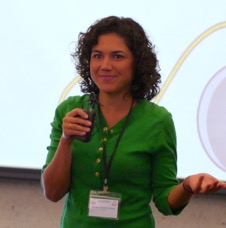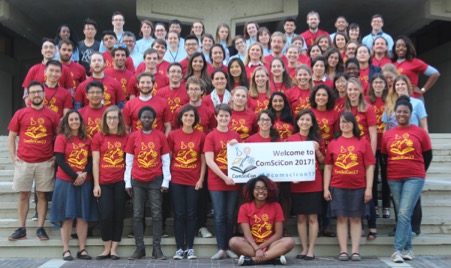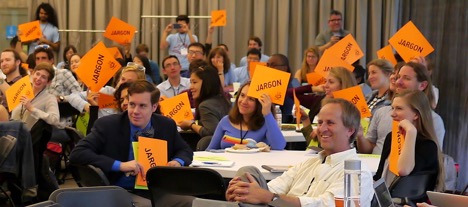By Ashley Moses, edited by Andrew S. Cale Each year, millions of scientific research papers are published. Virtually none of them can…
ComSciCon: Science Communication Workshops for Graduate Students, by Graduate Students
Publishing in scientific journals has long been a linchpin of success in science. But many scientists want their work to enrich the lives of the public and positively influence society. They’re increasingly realizing that communication solely among scientists is not sufficient for meeting those goals. Science communication (scicomm) is growing rapidly, and many organizations have begun to play a part in helping scientists improve their scicomm skills.
ComSciCon is one organization committed to doing just that. ComSciCon is a workshop series organized by graduate students, for graduate students, focused on leadership in science communication. Each year since our inception in 2013, we’ve held a national conference where 50 attendees from around the US converge with invited experts from a range of scicomm backgrounds for three days of discussions and hands-on workshops.
In addition to our flagship national workshop, we currently have 8 ComSciCon-local franchises around the country (and we’re growing!). Our local workshops are designed by graduate students in the respective cities, for graduate students studying in those cities, and they include local scicomm experts as speakers and facilitators. These workshops are focused on honing communication skills and building local scicomm communities. Whether you’re on the east coast, west coast, or somewhere in between, there may be a ComSciCon-local near you.
After five years of designing grad student-centered workshops, what have we learned about the most effective elements of scicomm training?
Emphasize conciseness & clarity
At each workshop, whether national or local, every attendee gives a “pop talk.” In 60 seconds, they’re challenged to effectively explain their research to an audience of non-specialists. The audience provides real-time feedback by waving their “Awesome” and “Jargon” signs as necessary.
Another element of many of our workshops is a mock interview, in which attendees describe their research as they would for an interview by a mainstream media outlet. They’re on camera, speaking to a journalist who probably isn’t an expert in their field, and need to describe — quickly! — why their research is important.
Learn By Doing
A ComSciCon experience includes very little passive information consumption.
For example, our 2017 national workshop included panels on communicating through media and journalism, digital storytelling, communicating about diversity in science, and science advocacy. Each featured invited experts on the topic and were comprised mainly of Q&As. We also had the opportunity to hear from Atlantic science writer Ed Yong in his keynote address his tips for scicomm success. All panels and talks were designed to trigger in-depth discussions, pushing us to connect ideas, synthesize, and ask questions.
Our program included many other hands-on elements as well. Some attendees honed their sketchnoting skills, using sketches to share scientific ideas, while others created video clips to share on social media. Our affiliated organization BiteScis brought K-12 teachers in to collaborate with the grad students on lesson plans that reflect the attendees’ research. One evening, we discussed clips of science films by Tangled Bank Studios.
Although the notion of storytelling arose frequently throughout the conference, our keynote workshop by Story Collider brought this topic to the forefront. Attendees had the opportunity to work with Executive Director Liz Neeley and Producer Nisse Greenberg over four hours to craft true, personal stories about science. Hearing the stories after this intensive workshop reminded us that science is a part of human life, and there’s no limit to the ways we can express our science stories effectively.
Iterate
A core component of every ComSciCon workshop is the Write-a-thon, which encourages attendees to craft pieces for a general audience. Since attendees complete first  drafts ahead of the workshop, they spend time at ComSciCon receiving feedback from peers and invited experts and iterating. We’ve found that most pieces become exponentially clearer and more interesting after the author shares with others and revises according to feedback. We work with our attendees to publish their Write-a-thon pieces in appropriate outlets after the workshop. You can see a sample of our published pieces on our website.
drafts ahead of the workshop, they spend time at ComSciCon receiving feedback from peers and invited experts and iterating. We’ve found that most pieces become exponentially clearer and more interesting after the author shares with others and revises according to feedback. We work with our attendees to publish their Write-a-thon pieces in appropriate outlets after the workshop. You can see a sample of our published pieces on our website.
We are excited to have recently become a project fiscally sponsored by The Story Collider, and look forward to continuing to grow in the future. We are actively seeking sponsors and partners, and we’d love to be in touch with readers and scicomm enthusiasts interested in learning more. You can follow us on Twitter (@ComSciCon) or reach out to me over email (rhendricks@comscicon.org). For information about applying to an upcoming workshop, please see our website.
Edited by Jason Organ, PhD, Indiana University School of Medicine
Want to stay connected with #SciCommPLOS or pitch an idea for a blog post? Tweet us at @SciCommPLOS or email us at scicommplos@gmail.com.



[…] https://blogs.plos.org/scicomm/2017/09/11/comscicon-science-communication-workshops-for-graduate-stud… […]